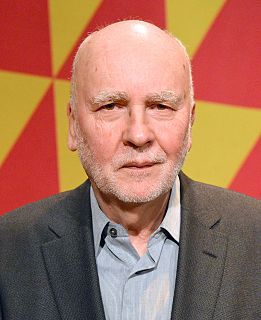A Quote by W. H. Auden
Far from his illness The wolves ran on through the evergreen forests, The peasant river was untempted by the fashionable quays; By mourning tongues The death of the poet was kept from his poems.
Related Quotes
Gabriel Levin's book is a journey through time and through entrenched animosities of the Middle East. What's astonishing and refreshing is his ability to combine the reporter's perspective with a deep knowledge of poetry, including pre-Islamic Arab poems. A brilliant poet is at work here-a poet in the rugged landscape of conflict and pain.
Branches grew from his hands, his hair. His thoughts tangled like roots in the ground. He strained upward. Pitch ran like tears down his back. His name formed his core; ring upon ring of silence built around it. His face rose high above the forests. Gripped to earth, bending to the wind's fury, he disappeared within himself, behind the hard, wind-scrolled shield of his experiences.
The water of the fountain ran, the swift river ran, the day ran into evening, so much life in the city ran into death according to rule, time and tide waited for no man, the rats were sleeping close together in their dark holes again, the Fancy Ball was lighted up at supper, all things ran their course.
He ran as he'd never run before, with neither hope nor despair. He ran because the world was divided into opposites and his side had already been chosen for him, his only choice being whether or not to play his part with heart and courage. He ran because fate had placed him in a position of responsibility and he had accepted the burden. He ran because his self-respect required it. He ran because he loved his friends and this was the only thing he could do to end the madness that was killing and maiming them.
Who can break the law? If I break this glass, it will fall down. If anyone succeeds in throwing one atom out of place, every other atom will go out of balance. . . . The law can never be broken. Each atom is kept in its place. Each is weighed and measured and fulfils its [purpose] and place. Through His command the winds blow, the sun shines. Through His rule the worlds are kept in place. Through His orders death is sporting upon the earth. Just think of two or three Gods having a wrestling match in this world! It cannot be.
Out of the silver heat mirage he ran. The sky burned, and under him the paving was a black mirror reflecting sun-fire. Sweat sprayed his skin with each foot strike so that he ran in a hot mist of his own creation. With each slap on the softened asphalt, his soles absorbed heat that rose through his arches and ankles and the stems of his shins. It was a carnival of pain, but he loved each stride because running distilled him to his essence and the heat hastened this distillation.






































